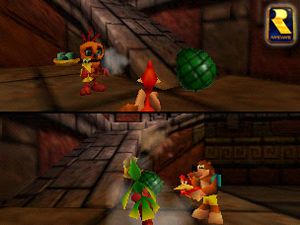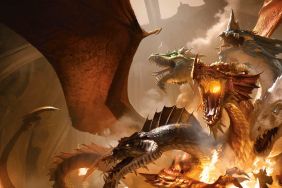Getting Jiggy wit’ it.
The major selling point of Banjo-Tooie, sequel to the nifty Banjo-Kazooie,
is that Banjo the Bear and Kazooie the Breegull can now be separated. Separated?
Here you’ve got a combination bird/bear that appeals to all my genetic tampering
whims, and they want to split them apart?
Let’s not stop there… I want more crazy animal combinations! Why stop at
cloning sheep and Jurassic dinosaurs when we can make a wooly raptor? Pigeon-rats,
duck-goats, hippo-giraffes…just think of all the ethic-less possibilities!
I’ve always thought that a monkey’s tail on my ass would be a sure hit with
the ladies. (Some of us need all the help we can get, eh Johnny? – Ed.)
Banjo and his buddies are playing a chummy game of poker. Unbeknownst to them,
in the darkest and murkiest shadows, the evil Gruntilda is being resurrected.
Upon her return to earthly soil, her first act is to blow Banjo and Kazooie’s
house to smithereens. When the dust settles, Banjo finds his friend, Bottles
the Mole, burnt to a charcoal stick. Bottles’ ghost cries out for vengeance.
Banjo and Kazooie must sally forth into the depths of the Isle of Hags to layeth
the smacketh down on Gruntilda.
Like most 3D platformers, this game is all about item collection, the finding
and accumulation of different objects. Jiggies are key puzzle pieces and your
chief collecting goal. Each level has a puzzle piece quota that must be met
to proceed. But, in order to find all those hidden puzzle pieces, you need to
build up a repertoire of moves. By collecting music notes, you gain access to
new moves. Learning moves and finding jiggies cycle into one another and push
you forward through the game.
Yes, it can be redundant, but it’s the nature of this genre. It isn’t as bad
as Donkey Kong 64‘s special brand of redundancy
– finding different colors of bananas over and over as different monkeys – but
Banjo-Tooie can still feel repetitive.
Nonetheless, learning new moves does keep things moving along nicely. And
as you progress, you’ll find interesting puzzles that require more than just
hitting a switch with the right fruit.
One of the cool abilities is Kazooie’s power to shoot different types of eggs.
Four new types of eggs in various flavors for all your puzzle solving needs
can be found, much like the powered arrows from Majora’s Mask. Grenade eggs
can blast through cracked doorways. Ice eggs can put the freeze on baddies.
And in certain areas, the game switches into a Goldeneye-esque
first-person mode with a Kazooie gun.
This is actually one of the mini-games, which on the whole are a good change
of pace and feel less forced than those in DK 64. They aren’t meant to
be full stand-alone games, but they are a pleasant way to break the flow of
constant collection. Plus, you can go back and play these mini games in multi-player
modes.
Breaking up is hard to do, but Banjo and Kazooie have managed it. There are
pads that allow the bear and bird to split up and go exploring on their own,
and they both have new moves to learn. The game picks up where the last one
left off, so you still have all the abilities you learned in the first outing.
It keeps the game from feeling like a straight rehash.
Still, there are more abilities. You see, Mumbo-jumbo isn’t the only practitioner
of the dark arts anymore. Wumba-jumba, the stereotyped Indian lassie, can transform
you into all sorts of objects, from an armored carrier to a washing machine,
complete with new moves for each transformation. The washing machine shoots
out underwear. Yeah! Remember the T-Rex transformation promised in the last
game? They make good on their promise… but at the cost of frame-rate. Which,
as it turns out, is the major snafu of the game.
 While
While
it doesn’t really slow down, the framerates take a noticeable dip when venturing
into the larger areas (especially when you are in the “I can be a giant T-Rex”
stage). It can get annoying, though these big gameplay areas fit with the nature
and design of the levels, and playing through these vast worlds allow you to
really appreciate their scale. Plus, there’s no fogging. Perhaps if the game
gave up its pretty rendered shadows, it could squeeze out some better framerates.
The shadows can be attributed to the impressive light-sourcing. Moving lights,
bi-directional sources, tinting, and those shadows were all sweetly pumped out
of the elder N64. Suffice it to say that the shadow of a bird/bear is truly
unique. Sometimes lighting is even used proactively to progress through the
game. A flame egg can be shot out to light a path in a dark tunnel. Very nice.
Another neat detail is the amount of animation in the game… specifically,
the death animation. I start out with one unsuspecting enemy. Apply Banjo’s
standard roll attack, and this enemy gets stunned and falls over. I turn into
a car and mow down this same enemy. It goes flying. I set the enemy on fire
and it runs around a little before collapsing over. These are the details that
are appreciated. All in all, the game is graphically beautiful, but not the
same leap of beauty that the first one was.
The tunes fit the cartoon nature of the game. It might have been cool to mix
it up a little, but memories of the DK64 rap are
a harsh reminder of what “mixing it up” might negatively entail. The music is
dynamic – the main melody changes depending on where you are in a level. The
music is done well, but limited to MIDI tunes. All the creatures still talk
in Mumble-nese, the language of Banjo-Kazooie. Instead of audible voices,
they are just sounds reflective of the characters. Hilarious to most, but annoying
to some.
There’s something very magnetic about this game that keeps pulling me back
to grab more jiggies. Sure, it can be redundant at times, but the creative puzzles,
mini-games and large levels offer a nice variety. And it is a lot less redundant
than Donkey Kong 64. The framerate drops can be bothersome, but it’s
still a fun 3D platformer. Despite my desires for new forays in genetic tomfoolery,
Banjo-Tooie is a worthy successor. Now about my tail…

-
Well-designed, large levels
-
Graphical details
-
Mini-games to mix it up
-
Can get redundant
-
Framerate dips










